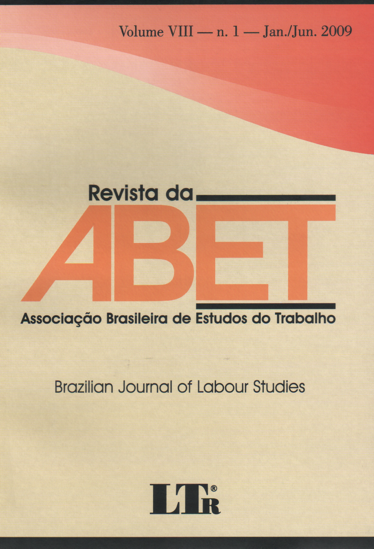Syndicalism Active Bank Clerk of the Century XXI
Abstract
This article argues some clarifying factors of the transformations in the bank workers Union after the reorganization of the financial system in the nineties in Brazil and analyzes the unfoldings of the tactics adopted for these workers organized in the first years of century XXI. Compose the analysis the intense reduction of the formal job in the banks, the selectivity of the syndical representation and the class segmentation enters the workers in banks, the preservation of raised taxes of syndicalization in the unions of the banks, the constitution of great metropolizadas syndical machines and the mercantile rendering of services, the professionalization of the syndical managers and the substitution of the workers for controllers or third in the direct action of mobilization and protests. Conjugated diverse tactics of organization, the workers Union adjusted to the challenges imposed by the re-struturing, they survived to the syndicate crisis in the nineties and give new directions to represent workers multiple interests integrated to the strategic aims of the financing corporations, contributing to the conflicting amplification of the real subordination of the work in the capital. The article is composed of four sections. The first section relates to the transformations of the banking sector and its impacts on employment. The second section presents an analysis of the changes faced by the bank workers trade union and the defined strategies, while the third section is dedicated to the impasses that emerged among the bank workers after the transformations verified in the sector and the trade union. Finally, the conclusions.
Downloads
Downloads
Published
How to Cite
Issue
Section
License
Política de Acesso Livre
Esta revista oferece acesso livre imediato ao seu conteúdo, seguindo o princípio de que disponibilizar gratuitamente o conhecimento científico ao público proporciona maior democratização mundial do conhecimento.
Atribuição dos artigos é não comercial (sem derivações 4.0, isto é, Creative Commons) e o acesso é livre e gratuito para download e leitura.
Não há taxa para submissão, avaliação e publicação de artigos.
Copyright
1) Os artigos são de responsabilidade exclusiva dos autores. É permitida sua reprodução, total ou parcial desde que seja citada a fonte.
2) Os trabalhos enviados para publicação devem ser inéditos, não sendo permitida sua apresentação simultânea em outro periódico nacional.
3) Os artigos são submetidos a pareceristas "ad hoc", após prévia avaliação da Comissão Editorial, os quais podem aceitar, recusar ou reapresentar o original ao autor com sugestões para alterações. Os nomes dos pareceristas permanecem em sigilo, bem como os nomes dos autores.
Os Autores que publicam nesta revista concordam com os seguintes termos:
Autores mantêm os direitos autorais e concedem à revista o direito de primeira publicação, com o trabalho simultaneamente licenciado sob a Creative Commons Attribution License, permitindo o compartilhamento do trabalho com reconhecimento da autoria do trabalho e publicação inicial nesta revista.
Autores têm autorização para assumir contratos adicionais separadamente, para distribuição não-exclusiva da versão do trabalho publicada nesta revista (ex.: publicar em repositório institucional ou como capítulo de livro), com reconhecimento de autoria e publicação inicial nesta revista.
Autores têm permissão e são estimulados a publicar e distribuir seu trabalho online (ex.: em repositórios institucionais ou na sua página pessoal), já que isso pode gerar alterações produtivas, bem como aumentar o impacto e a citação do trabalho publicado.
Patrocinador
A publicação recebe financiamento da Associação Brasileira de Estudos do Trabalho.










